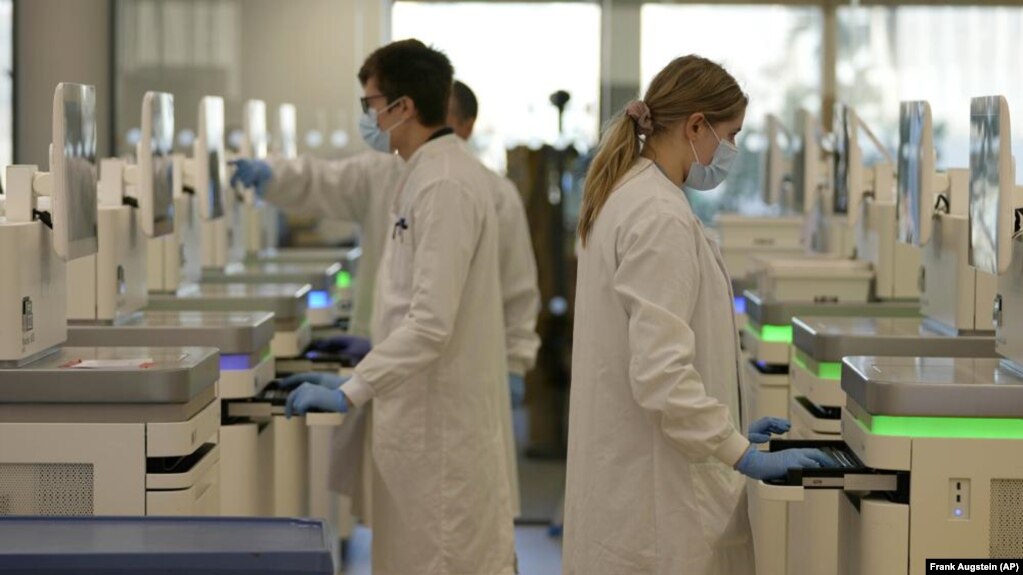British Labs Supply the World with Genetic Information about COVID-19

British scientists have created a fast, less costly process for genome sequencing each coronavirus case they examine.
Britain is now a world leader in COVID-19 sequencing. This helps public health officials follow the spread of new variants, develop vaccines and decide when restrictions on movement are necessary.
Researchers at the Sanger Institute in Cambridge and other laboratories in Britain have a new mission. They are sharing what they have learned with scientists around the world.
The Omicron variant now spreading in many countries shows the need for worldwide cooperation, said Ewan Harrison. He is a top researcher at Sanger.
Omicron was first found by scientists in southern Africa who quickly informed the world and gave officials time to prepare.
Since dangerous mutations of the virus can happen anywhere, scientists must continually watch its development to protect everyone, Harrison said.
“We can’t just kind of put a fence around an individual country or parts of the world, because that’s just not going to cut it,’’ he said.
Cambridge University Professor Sharon Peacock understood the importance of sequencing the virus early in the pandemic. She knew sequencing would be important to fighting the virus. She received British government money for a national organization of scientists, laboratories and testing centers known as the COVID-19 Genomics UK Consortium.
The consortium is now working to increase knowledge of sequencing around the world. It has built training programs for researchers in developing countries. The programs include planned online classes on information sharing and working with public health officials. The goal is to help researchers build national programs to sequence COVID-19 viruses.
“There is inequity in access to sequencing worldwide,” the group said, adding that it wants to end the unequal situation.
By sequencing as many cases of the virus as possible, researchers hope to identify variants of concern as quickly as possible. They can then follow their spread and give early warnings to health officials.
Britain has supplied more COVID-19 sequences to researchers around the world than any country other than the United States. It has also sequenced a bigger percentage of its cases than any large nation.
Researchers in Britain have released about 1.68 million sequences, or about 11 percent of reported cases, said GISAID. GISAID is an international organization that works for quick sharing of virus information.
Over the past two years, labs around Britain have refined the process of gathering and studying COVID-19 viruses.
This has helped cut the cost of examining each genome by 50 percent. It has also reduced the time is takes to sequence from three weeks to five days, said the research group Wellcome Sanger.
Increasing sequencing ability is like building a pipeline, said Dr. Eric Topol. He is head of innovative medicine at Scripps Research in San Diego, California. In addition to buying costly sequencing machines, countries need supplies of reactive chemicals for the machines. They also need trained people to do the work and who understand the sequences. They also need systems to share the information quickly.
Meeting those needs has been difficult for many nations, including the U.S. It is even harder for developing nations, Topol said.
“Many of these low- and middle-income countries don’t have the sequencing capabilities, particularly with any reasonable turnaround time,” he said. “So, the idea that there’s a helping hand there from the Wellcome Center is terrific. We need that.”
Virus samples arrive from around the country. Lab assistants carefully prepare the genetic material. It is placed into the sequencing devices that read each sample’s unique DNA. Scientists then examine the information and compare it with other identified genomes to follow mutations. They want to see how the virus is developing.
Because COVID-19 mutates all the time, it is important to look for new, more dangerous variants that might be resistant to vaccines, Harrison said. This information will help researchers change existing vaccines or create new ones to fight the virus.
Harrison praised South Africa for quickly informing the world about the Omicron variant. But other countries, he said, punished South Africa by restricting travel and harming its economy. All nations must be permitted to publish new variant information without fear of being punished, he said.
Words in This Story
genome –n. the entire set of genetic instructions found in a cell
sequencing – n. a process of finding out the order of the amino acids forming the genetic material of an organism
variant – n. something that is different in some way from others of the same kind
mutation – n. a permanent change in the genes of an organism
consortium – n. a group of people or companies that agree to work together
access –n. the ability to get something, enter a place or meet someone
refine – v. to improve (something) by making small changes
sample –n. a small amount of something that is used to give information about what it was taken from
unique – adj. used to say that something or someone is unlike anything or anyone else
https://learningenglish.voanews.com/a/british-labs-supply-the-world-with-genetic-information-about-covid-19/6397191.html